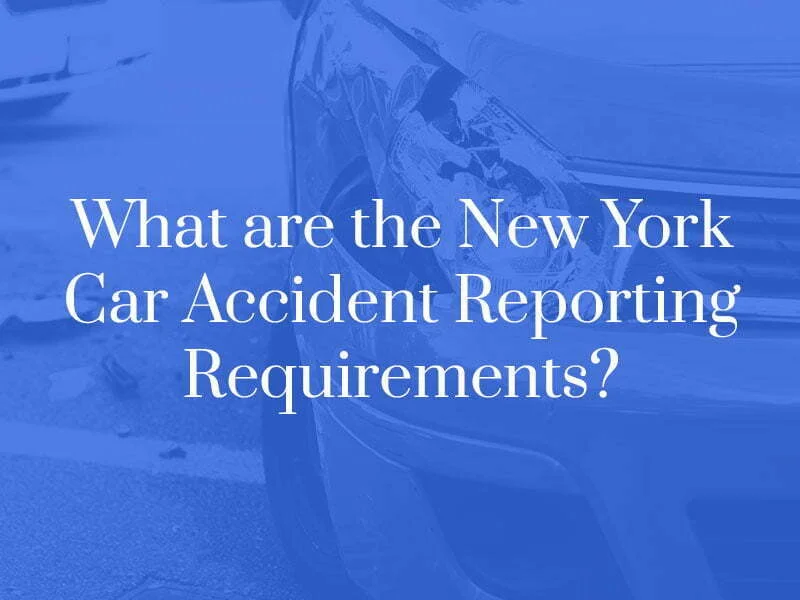After a car accident in New York, there are several reporting requirements to follow in order to protect your right to compensation. Not all collisions must be reported at the time they occur, but even so, filing an accident report is to your benefit.

New York State Reporting Requirements
The New York State Vehicle and Traffic Law requires that car accidents involving injury or death must be reported to the police and Department of Motor Vehicles (DMV) The police also file a Report of Motor Vehicle Accident (MV-104) with the DMV, even when one party has already done so. Leaving the scene of an accident that causes personal injury or death is considered a crime.
If no one is hurt and the amount of property damage exceeds $1,000, the police do not need to be notified. However, an accident report must still be filed with the DMV by every driver involved in such an accident, and within 10 days.
In property damage only accidents, amounting to less than $1,000, the parties involved need only exchange insurance, registration, and driver’s license information. If the damage is to a parked vehicle, then the vehicle’s owner must be located and informed, or else the police have to be notified.
Reporting an accident is the safest choice when in doubt of the requirements, or unsure of the amount of property damage.
Insurance Reporting Requirements in New York
Car accidents are not required by New York law to be reported to your car insurance company. However, if you would like to receive benefits under your no-fault policy, including medical coverage and economic losses, you must tell your insurer about the collision within 30 days. Similarly, in cases involving a driver who is uninsured or underinsured, you must report the accident to your insurance company within 90 days to receive uninsured or underinsured motorist coverage. Even when chances are that you will not be filing a claim for benefits, notifying your insurance carrier is the safest choice, in case circumstances change.
Under New York’s no-fault insurance laws, drivers are required to file claims with their own insurance company, regardless of who was at fault for the accident. The right to sue the at-fault party for damages is restricted to severe injuries.
What Happens if You Don’t Report an Accident?
A failure to report an accident to the DMV, according to the above requirements, can result in a suspension or revocation of your driver’s license and possibly criminal charges. Charges often carry substantial fines and potential jail time. Additionally, an insurance company may dispute the claim if there is no accident report filed and too much time goes by.
How to File a New York Car Accident Report
The Report of Motor Vehicle Accident (MV-104) can be printed out and then completed, or drivers have the option of filling in the form online prior to printing. The following information is required:
- Driver license information
- Vehicle registration information
- Vehicle damage description(s)
- Accident location
- Names of all people involved and which vehicle they were in, whether seat belts were being used, whether an airbag deployed, and descriptions of injuries anyone suffered.
- Insurance information.
The completed document must be mailed to the DMV.
Get the Legal Representation You Deserve
Our experienced and compassionate New York City car accident attorneys have helped countless car accident victims recover the compensation they deserve. Call Sullivan Papain Block McManus Coffinas & Cannavo, P.C., at (212) 732-9000 today to discuss your own car accident in a free consultation.
